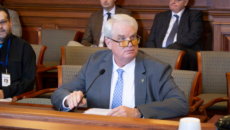Poplar Bluff, a city in the Missouri Bootheel, has just over 15,000 residents. In every respect, it’s a community at a crossroads, with big ambitions for growth that are still too often constrained by a small city budget. When help is available, however, there’s no shortage of desire for action and advancement there. The city has long sought to improve its animal control division, but with limited resources, there were few opportunities to do so. This all changed on October 7th, 2024, when Poplar Bluff’s city council, accepted a grant from the Humane Society of the United States (HSUS) and removed Missouri’s last animal euthanasia gas chamber. While it may take a few more weeks to remove and destroy the chamber, this move to end an archaic practice is a powerful signal of progress on animal welfare in our state.
In a sense, Poplar Bluff’s move helps to make a broader and bigger point, that Missouri is ready to step up for our canine and feline residents. From movement in the legislature on bills to increase penalties for animal cruelty, to the willingness of local law enforcement agencies to carry out training on animal abuse and neglect investigations, Missourians are embracing a new approach and partnerships that create lasting change from St. Joe to Sikeston.
As a lifelong Missourian, a veteran, and an animal lover who wants the best for the state, it fills me with pride to see such progress made, but the work of making our state kinder and better when it comes to animals isn’t anywhere close to finished. Missouri continues to top the “Horrible Hundred” list of the nation’s worst puppy mills. It is still home to pet stores with deep ties to the puppy mill industry that are now pushing for blanket protections for their inhumane unsanitary practices. Vet bills remain unaffordable for Missouri families who want a pet in their home. Finally, it is still the case that our shelters are often packed to the brim with adoptable dogs and cats in search of their forever families.
In respect to these and other issues concerning the welfare of our companion animals, we can forge a decisive humane agenda in the coming years. It is well within the reach of our citizenry—and our legislature— to take practical and principled action to address animal cruelty and neglect, press for necessary regulation and elimination of mass production puppy mills, tackle high veterinary costs, and advance the case for a permanent allocation of resources for our deserving animal shelters in future budgets. I believe we’re a great state full of good people ready to do the right thing for animals, and I’ve heard from many legislators and civic leaders that animal welfare is a popular and winning issue in the political arena. So I say, “let’s get it done.”

Missouri State Director for the Humane Society of the United States





